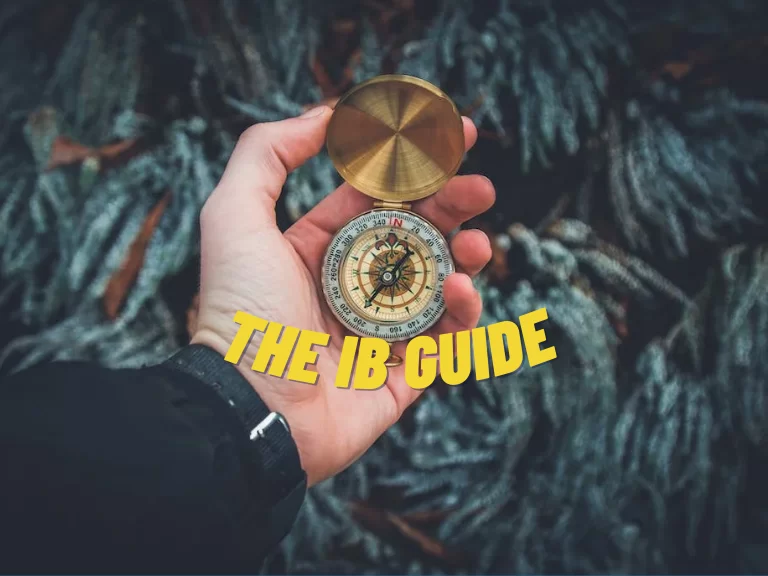IB Diploma Programme 101: Your Questions, Answered!
What is the IB Diploma Programme? Who are the IB? If you’re looking for the answers to these questions because you’re interested in IB DP1, you’re on the perfect page!
As IB graduates, we know there are loads of myths and fake news about the IB Diploma programme that can confuse (and scare!) students. This internationally recognised programme is challenging, but it’s not as terrifying as some make it out to be. Yes, it’s hard work, but the coursework helps prepare students to transition from school to higher education. Plus, it helps students develop a range of handy skills.
So, the tutors at Lanterna Education are here to unpack what you can expect during the DP1 and give you all the answers so you can make an informed decision about your studies.
Scroll down to learn about the IB, how the DP curriculum works, and how it prepares you for university and life after your studies!
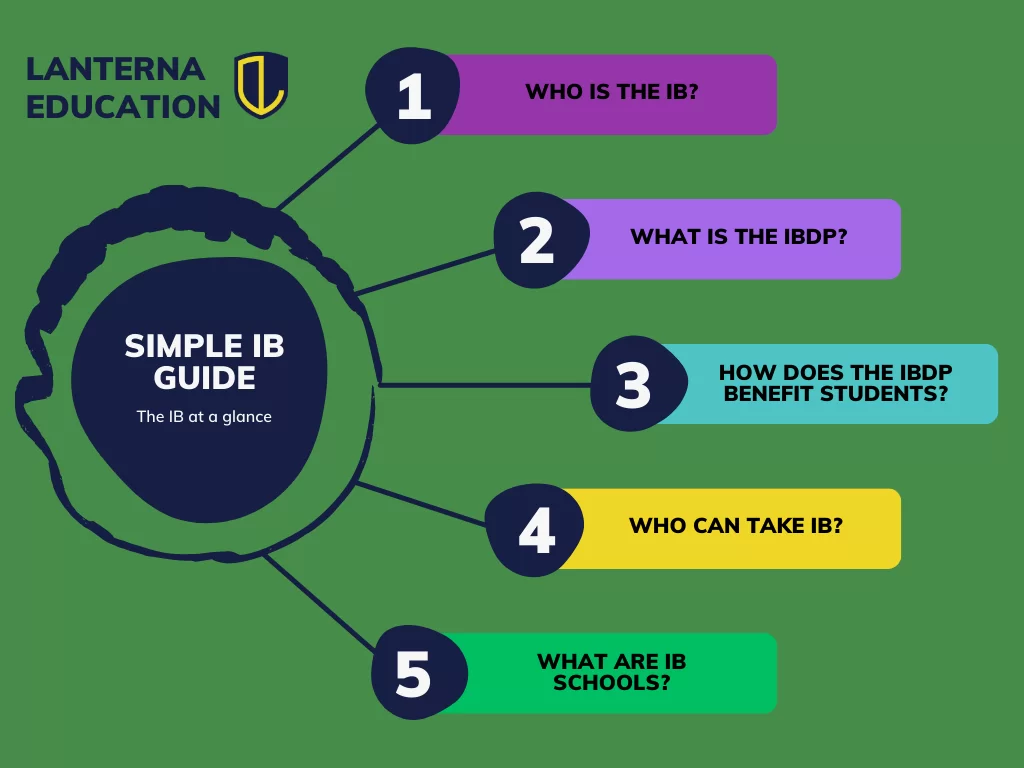
IB DP 101: A Simple Guide to the International Baccalaureate Diploma Programme
1) Who is the International Baccalaureate (IB)?
Originally known as the International Baccalaureate Organisation (IBO), the IB (International Baccalaureate) is a nonprofit organisation that began in 1968 to provide quality educational programmes to students between 3 and 19 years old.
Today, the IB offers globally recognised programmes to help young people around the world prepare for university and build the skills needed to succeed throughout their studies and lives.
2) What is the IB Diploma Programme (IB DP)?
Created for young people aged 16 to 19, the IB Diploma Programme (IB DP) is one of four optional secondary education programmes developed and offered by the International Baccalaureate (IB). The two-year programme (often called DP1 and DP2) has a globally recognised syllabus that allows high school students to progress academically, develop their creative thinking and earn an internationally renowned IB Diploma.
3) How does the IB Diploma Programme benefit students?
Ivy Leagues and the world’s leading universities accept IB Diploma certificates, making the university application process much easier. But the IB’s academically challenging programme doesn’t only show commitment and look great on university admission applications!
The IB syllabus also prepares students for higher education. The programme ensures that students graduating with the IB Diploma have the tools to succeed academically and build rewarding careers. Here are a few of the many benefits the IB Diploma programme offers:
- It nurtures curiosity, lifelong learning, exploration, ethical and critical thinking and promotes cultural understanding
- Students gain an excellent breadth and depth of knowledge
- It helps students grow and excel intellectually, physically, and emotionally
- Studying at least two languages improves student’s language abilities
- IBDP students graduate with the tools to build meaningful lives and are future-ready
- The IB Diploma qualification has international university recognition
4) Can anyone do the IB Diploma?
Yes! The great thing about the IB Diploma is that any student aged 16 to 19 around the world can choose to take the programme. However, only an IB School (or educational institutions with IB approval) can offer their students access to the full IB Diploma Programme and certificate.
5) What are IB Schools?
It may sound complicated, but IB Schools are just educational institutions with the International Baccalaureate’s permission to offer their programmes to its students.
In fact, almost any international school can apply to become an IB School and join a global school community of over 5,000 schools around the world offering the IB curriculum, DP subjects, exams and IB Diploma qualifications.
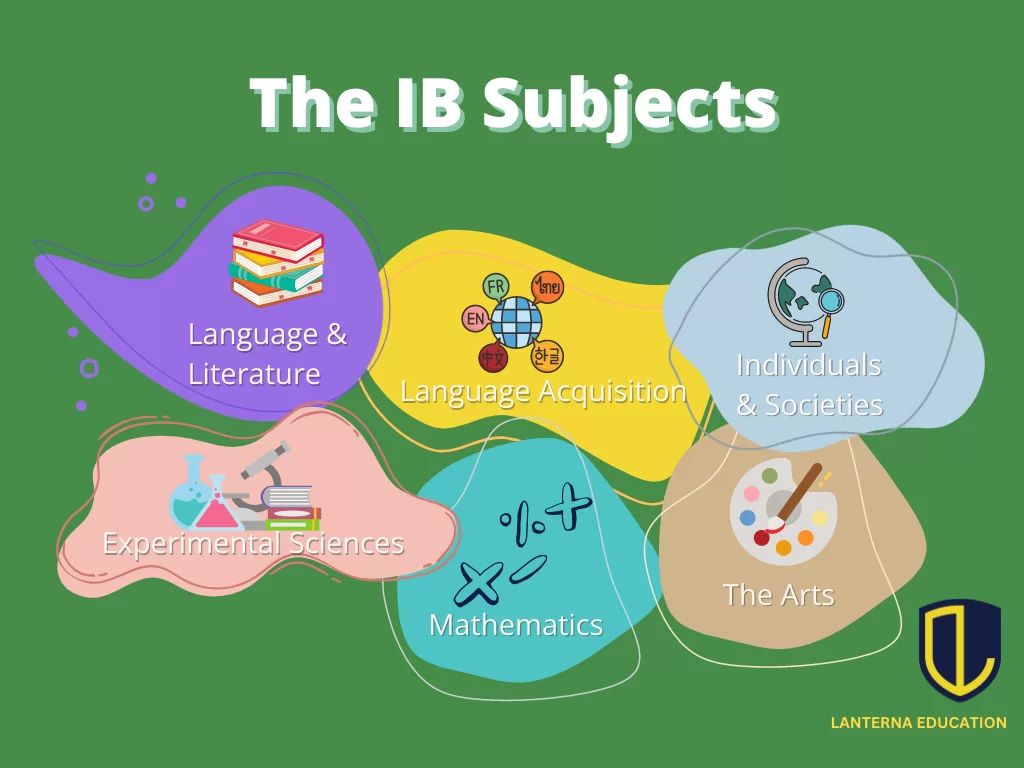
IB DP 101: International Baccalaureate (IB) Diploma Programme Curriculum and Subjects Explained
1) How does the International Baccalaureate (IB) curriculum work?
The IB Diploma Programme curricula has six subject groups and three mandatory core elements that Diploma Programme (DP) students must complete over two years to earn their International Baccalaureate (IB) Diploma certificate.
It sounds like a lot, and the programme is demanding. But its structure also allows flexibility, and each of the required components and six subjects are excellent preparation for future study at universities and other higher education institutions.
2) What courses do the IB Diploma Programme offer?
Each of the subject groups in the International Baccalaureate (IB) Diploma programme offers different courses. However, it’s important to remember that some countries and IB Schools may set mandatory subjects and different languages for students based on the national curriculum and available resources.
The International Baccalaureate (IB) Diploma programme offers the following subject groups:
- Language and Literature
- Language Acquisition (Second language)
- Individuals and Societies (Social Sciences)
- Experimental Sciences (Chemistry, Physics, Biology or Environmental systems)
- Mathematics (Analysis and approaches or Applications and interpretation)
- The Arts (Visual arts, Dance, Music, Film or Theatre)
How many subjects must IB students choose?
IB DP students must pick one subject from each of the subject groups, three of which must be Higher level (HL) and three must be Standard level (SL).
The IB Diploma Programme (DP) requirements include:
- Two languages (a first language and second language)
- Experimental sciences
- Mathematics
- Social sciences
What are IB HL and SL subjects?
Standard-level subjects require 150 hours of teaching, while Higher level subjects
need 240 hours of study. IB Higher level (HL) and Standard level (SL) courses also have different scopes but use the same grade descriptors.
Both subject levels require students to learn and display their understanding of a topic; the only difference is that Higher level (HL) subjects expect students to show a greater depth of knowledge, understanding and range of skills.
Can IB Diploma Programme students swap one course for another?
It all depends on the course! Languages, Sciences, Mathematics and Social Sciences are mandatory for all students, but students may take additional courses instead of studying the arts.
So you can select an extra Science, Language or Individuals and societies to replace the arts and meet the IB’s of six subject requirements.
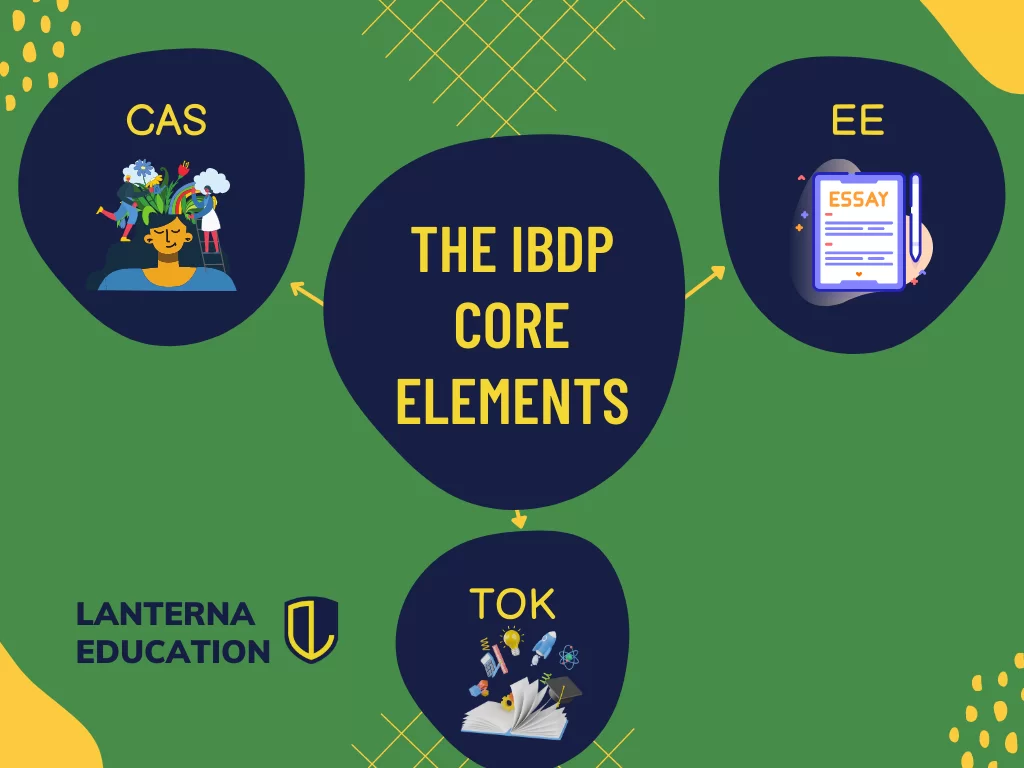
IB DP 101: Unpacking the IB DP Core Elements
What are the IB Diploma Core Elements?
The IB Diploma programme’s three core elements aim to broaden student’s education. Each project provides opportunities and challenges where students can apply their skills and knowledge.
The three DP core elements in the Diploma Programme are:
1) CAS
What does IB CAS mean?
CAS stands for Creativity, Activity Service. CAS projects combine a range of activities with academic study to develop a student’s personal and social skill sets and creative thinking. Creativity, Activity and Service projects are flexible and focus on students learning new skills through different activities. For example, Creativity can include learning photography or playing a new instrument; Activity can be a physical activity like learning to cook, and Service CAS can be acts of community service or volunteer work.
2) TOK
What is IB TOK?
TOK means Theory of Knowledge, and these projects focus on developing critical thinking skills and learning across a student’s chosen theory subjects. Theory of Knowledge assignments challenge DP students to explore and reflect on the nature of knowledge and make students reflect on how they know something.
3) EE
What does EE stand for in the IB?
EE is an extended essay that requires DP students to formulate a research question, conduct research to support an argument and submit a 4000-word document at the end of the project. By allowing students to do independent research on a topic of personal interest, the IB extended essay project provides opportunities for students to improve communication, develop evidence-based arguments and explore their interests.
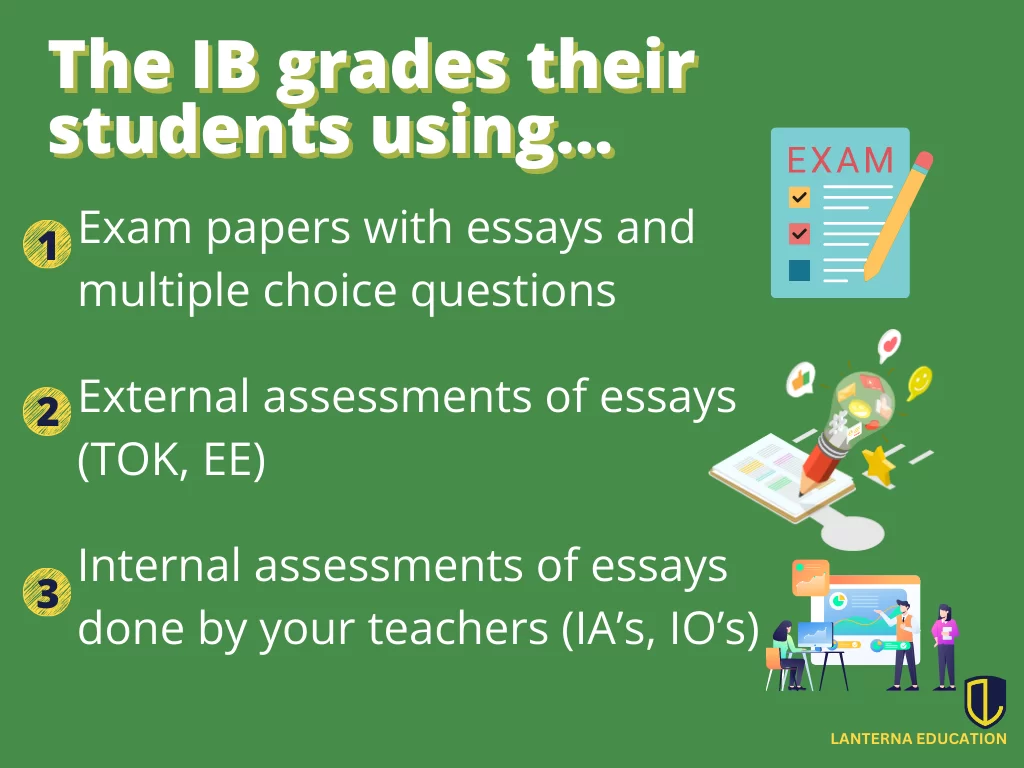
IB DP 101: Understanding the IB (DP) Assessments and Exams
1) How do the International Baccalaureate mark IB programme students?
The International Baccalaureate (IB) calculates grades and results based on a set minimum standard of performance for Theory of Knowledge projects, Extended Essays and Creativity, Activity Service projects.
The IB gives students goals for their coursework, and they use student work as evidence of their progress and achievements over the two-year Diploma programme.
The IB marking criteria for students includes:
Basic skills:
- Learning and recalling knowledge
- Understanding key concepts
- Applying standard methods and techniques
Academic skills:
- Analysing and using information
- Assessing and forming arguments
- Creative problem solving
Intercultural skills:
- Considering international perspectives
- Understanding different cultural contexts and attitudes
2) What IB Diploma assessments and exams do students do?
The IB uses external and internal assessments to review students’ progress. However, final examinations are the most common type of assessment for IB courses because they are reliable assessment methods, and they ensure all students use a standard level of testing no matter which countries or areas they live in.
IB final exams often include:
- Essay exam questions
- Structured problems
- Short-response questions
- Data-response questions
- Case study questions
- Multiple-choice exam questions (these are rare!)
IB Diploma Programme External Assessment Types
Several programme areas use externally assessed coursework that allows IB students to work over an extended period while taking responsibility for their own learning and conducting their own research while supervised by appointed teachers. These assessments then go to external examiners for marking.
IB External assessments include:
- Theory of Knowledge
- Extended Essay
IB Diploma Programme Internal Assessment (IA) Types
Most courses have internal assessments (IAs) too. IAs are research-based assignments for each subject that students complete during the IB Diploma course’s second year (DP2). Student’s teachers grade these assignments and send samples to independent moderators to approve or change based on the work they receive.
Internal Assessments (IAs) include:
- Orals for Language and Literature and Language Acquisition
- Fieldwork for Geography
- Laboratory work for the Sciences
- Investigations for Mathematics
- Artistic performances

Master IB DP1 with Lanterna Education!
Lanterna Education tutors have years of experience helping students reach their full potential and get the marks they need to enter top universities worldwide.
We would love to help you! Check out our one-on-one tutoring with experienced tutors. We provide Free revision advice, resources, and study guides for students in the IB Diploma programme.
Good luck! We hope we’ve helped you understand the IB DP and busted any myths that may have stopped you from choosing the IB and reaching accademic success.
